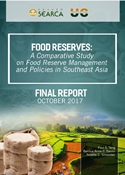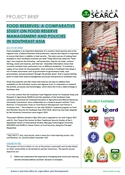Food Reserves: A Comparative Study on Food Reserve Management and Policies in Southeast Asia
Background
Food availability is an important dimension of a country's food security. At the regional level, a balance in food production, exports, and imports is important to ensure that there is stability in food security. The main sources of making food available in most Southeast countries are what Teng1 has called the "food taps" and comprise the following – self production, imports via trade, contract farming, stocks and reserves, and food aid. Anecdotal information shows that countries stockpile food, particularly rice, in different modalities. To maintain a supply of rice stocks for the population, most countries in Southeast Asia adopt a mix of trade instruments such as government-to-government trade, local procurement, and procurement through the private sector. Rice is a good starting point to study food reserve management processes and policies in Southeast Asia.
Given the potential role that stocks and reserves can play to stabilize food availability at the individual country and regional level, it is important to research the policies, processes, and technologies, which allow this to be a viable strategy in Southeast Asia.
It is in this context that the Southeast Asian Regional Center for Graduate Study and Research in Agriculture (SEARCA) and the members of the Southeast Asian University Consortium for Graduate Education in Agriculture and Natural Resources (University Consortium/UC) collaborated on a research project entitled "Food Reserves: A Comparative Study on Food Reserve Management and Policies in Southeast Asia." This initiative was in line with SEARCA's umbrella program on Food and Nutrition Security for Southeast Asia 2014-2019, which has also been adopted by the University Consortium since August 2014.
The project was implemented from May 2015 to October 2017 with Dr. Paul Teng of the Center for Non-Traditional Security Studies of the S. Rajaratnam School of International Studies, Nanyang Technological University (RSIS/NTS), Singapore and SEARCA's Senior Fellow on Food Security, being the Principal Researcher.
Objectives
The project initially focused on rice as the primary commodity, but included details on other commodities selected by partner institutions. The specific project objectives were to:
- Define and understand the importance of keeping food stocks and reserves, and the rationale behind each country’s decision to stockpile;
- Identify the commodities that countries stockpile and the modalities and mechanisms of food stockpiling that have been adopted, including physical, virtual, trade, national, and regional mechanisms;
- Examine the implications of a changing regional trade regime on a country’s food stocks, as well as the impact of individual country’s food reserves on a regional stockpiling mechanism such as APTERR; and
- Explore the feasibility of establishing other types of regional stockpiles beyond reserves.
Methodology
Activity 1: Survey and analysis of food reserve management and policies among SEA countries (R&D)
The approaches used under this activity were as follows:
- Collate and assess all studies on food stocks and stockpiling thus far and conduct survey and focus group discussions where needed, so as to understand the rationale behind countries' decision to stockpile, identify the commodities that countries stockpile, the modalities and mechanisms of food stockpiling adopted, relevant government policies; and
- From the results of the study, identify policy implications and recommendations for the ASEAN region, including optimal stockpiling modalities, and examine challenges and possible ways of implementation (e.g., determining the appropriate level of food reserve, timing of storage and release of emergency stocks, and financial sustainability).
Activity 2: Regional workshop (Capacity building)
Activity 3. Publication (Knowledge Management)
Project Outputs
Activity 1 – (i) Explication of the techniques, processes, and responsible agencies for managing food stocks and reserves in all SEAsian countries; (ii) Collation of all relevant policies on food stocks, reserves, and stockpiles in SE Asia; and (iii) Identification of regional or non-government food stocks and reserves.
- Country survey completed in eight Southeast Asian countries, namely, the Philippines, Indonesia, Malaysia, Thailand, Cambodia, Lao PDR, Myanmar, and Vietnam;
- Country reports on existing food reserve management practices and policies, key issues and concerns, and way forward; and
- Project report with comparative/cross-country analysis.
Key Findings:- Stockpiling is still the dominant strategy employed by Southeast Asia in ensuring food availability.
- There is very little variation in the countries’ rationale behind food stockpiling. The two most commonly cited are food availability during emergencies, and price stabilization.
- There has been a notable shift towards stockpiling for export purposes for the rice-exporting countries such as Thailand. Meanwhile, rice-importing countries are increasingly pursuing rice self-sufficiency. Thus, food stockpiling mechanisms still differ from country to country.
- One of the biggest challenges faced by Southeast Asian countries in relation to food security is climate change.
- There is a need to review current trade policies and regulations to ensure that food security and international trade are harmonized, especially with the goal of creating a common ASEAN market.
- Countries are starting to stockpile other commodities aside from rice owing to increasing incomes, diversifying diets, and changing lifestyle.
Activity 2 – One regional workshop open to all interested SE Asian countries and to multi-lateral organizations on food stocks and reserves, in relation to food security. Results of Activity 1 will be shared at this workshop.
- A regional workshop on food reserve management and policies in Southeast Asia was held on April 2017 at the SEARCA Headquarters in Los Baños, Laguna, Philippines. The workshop aimed to improve understanding on the role that food reserves and stockpiles can play in national and regional food security. Representatives from all target countries attended the event.
- Additionally, the workshop was used to identify implications of a changing regional trade regime (such as the AEC2015) on a country’s food stocks, as well as the impact of each individual country’s food reserves on regional stockpiling mechanism.
Anticipated Outputs
Activity 3 – Policy brief and/or monograph
____________________
1 Teng, Paul P.S. 2013. Food Security: What it means for a Food-Importing Country. RSIS Commentaries. No. 222/2013 dated 4 December 2013


